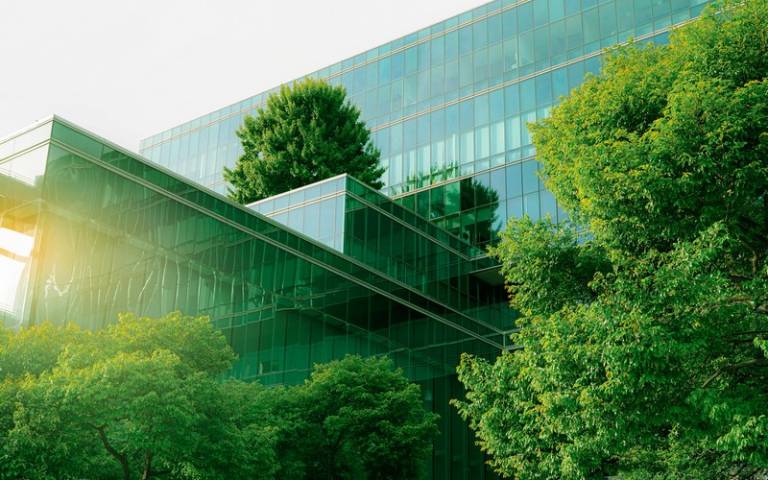Strategic alliance fuels talent pipeline in the real asset sector
A new industry partnership is bringing together industry and UCL staff and students through a new centre to address sustainable development challenges in real estate.

14 December 2023
Photo credit : istock Fahroni
Sustainable technologies that reduce the costs and environmental impacts of building processes and materials are needed to design, build and manage real estate suitable for a net-zero future.
A new strategic alliance, established between UCL and PGIM Real Estate, is nurturing new talent, leveraging world-class research and building an innovation ecosystem that combines AI, property technologies and environmental, social and governance (ESG) objectives.
To help deliver the sustainable development goal (SDG) targets, large multinational companies like PGIM Real Estate are adapting their business models to work and invest sustainably. PGIM Real Estate applies industry ESG criteria to screen potential investments and to develop its own socially responsible corporate policies.
To accelerate the process, PGIM Real Estate has selected four universities world-wide, including UCL to leverage new technologies and research from academics and gain insights to drive innovations that will benefit society.
As a first step for the alliance, the UCL Centre for Sustainability and Realtech Innovation, powered by PGIM Real Estate opened in October, 2023. It brings together PGIM Real Estate’s industry experts with academic expertise from across UCL, including from UCL Computer Science and the UCL Bartlett Faculty of the Built Environment.
The centre provides a physical space where thought leadership, innovation and education can thrive across emerging digital technologies, architectural materials, construction, and design.
To nurture new talent in these disciplines, the alliance is supporting a number of PhD scholarships including several venture PhDs, and encouraging research that can be commercialised through spin-out companies. MSc scholarship places are also being funded, including places on UCL MScs in Bio-Integrated Design, AI for Sustainable Development, Financial Risk Management and Computational Finance.
Workshops and events bringing together PGIM Real Estate, UCL staff and students, spin-outs and startups, and other industry players will help build an ecosystem of knowledge and innovation and how they can be used to improve efficiency in regulating and managing buildings. For example, hackathons will bring students together to develop business ideas, design and programme code, write business proposals and pitch ideas to industry experts.
“This collaboration underscores the multidisciplinary approach we are championing at UCL to address the pressing challenges of our times"
"The alliance doesn't just resonate with one department but holds profound relevance across the entire faculty,” explains Professor Nigel Titchener-Hooker, Dean of UCL’s Faculty of Engineering Sciences. “From Computer Science to Civil, Environmental and Geomatic Engineering, and even the School of Management, we see an integrated vision for sustainability. This collaboration underscores the multidisciplinary approach we are championing at UCL to address the pressing challenges of our times."
“Developing long-term transformational partnerships between universities and RealAssetX is vital to creating new, sustainable solutions to advance innovation in the industry,” says Naqash Tahir, Executive Director, CIO Office at PGIM Real Estate.
Professor Christoph Lindner, Dean of the UCL Bartlett Faculty of the Built Environment, adds: "The built environment is at a critical juncture and needs to evolve sustainably and intelligently. This partnership with PGIM Real Estate creates a significant leap forward in the right direction. By bridging the gap between academia, technology, and real estate, we can develop innovative solutions that will redefine how we experience and interact with the spaces we inhabit.”
 Close
Close


